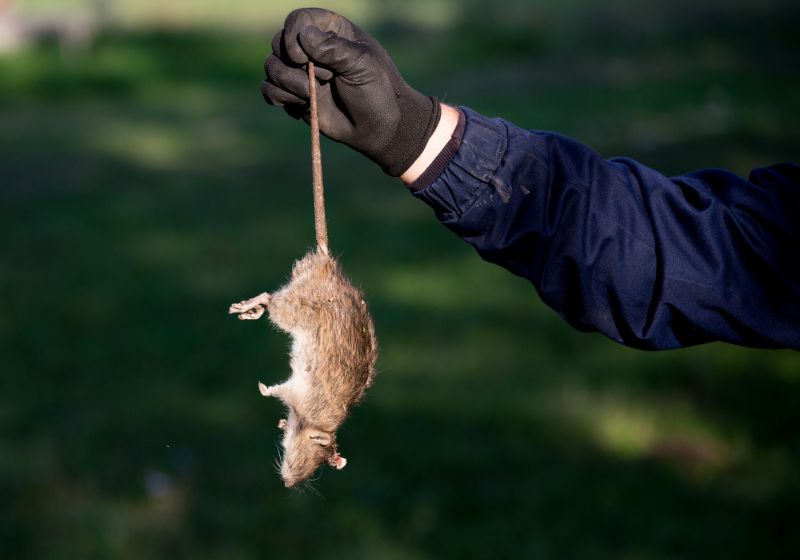Expert Picks for Dead Animal Removal Equipment
Choose from top-rated tools and products designed to help you manage dead animal situations quickly and safely.
 Dealing with dead animals can be a challenging and unpleasant task, often requiring specialized products to ensure safe and effective removal. Various tools and supplies are designed to assist in locating, extracting, and disposing of carcasses in a manner that minimizes health risks and odor issues. From simple gloves and trash bags to advanced detection devices, there are numerous options tailored to different situations and levels of complexity.
Dealing with dead animals can be a challenging and unpleasant task, often requiring specialized products to ensure safe and effective removal. Various tools and supplies are designed to assist in locating, extracting, and disposing of carcasses in a manner that minimizes health risks and odor issues. From simple gloves and trash bags to advanced detection devices, there are numerous options tailored to different situations and levels of complexity.
Top Overall Option
Multi-Use Dead Animal Removal Kit
A comprehensive kit that includes durable gloves, long-handled tools, odor-neutralizing sprays, and disposal bags designed to handle various sizes of carcasses safely and efficiently. Its versatility makes it suitable for both indoor and outdoor use, providing a practical solution for different scenarios.
Types of Products For Dead Animal Removals
Heavy-Duty Trash Bags
Large, puncture-resistant bags designed for secure containment and disposal of carcasses.
Long-Handled Grabbers
Tools with extended reach to safely pick up carcasses without direct contact.
Protective Gloves
Heavy-duty gloves to ensure safe handling and reduce contamination risk.
Odor Neutralizers
Sprays and powders formulated to minimize lingering odors after removal.
Detection Devices
Electronic tools that help locate hidden or buried carcasses.
Disinfection Sprays
Disinfectants suitable for sanitizing affected areas post-removal.
Portable Shovels
Sturdy shovels for digging out or removing carcasses from the ground.
Baited Traps
Traps used for capturing or attracting dead animals in specific situations.
Biohazard Waste Containers
Specialized containers for safe containment of hazardous biological waste.
Infrared Thermometers
Devices to detect heat signatures, useful for locating hidden carcasses.
Animal Carcass Disposal Bags
Biodegradable bags designed specifically for carcass disposal.
Remote Cameras
Cameras used to monitor inaccessible areas for carcass location.
Popular Choices
Widely used for secure containment and disposal of dead animals in various environments.
Commonly employed for safe pickup and removal of carcasses from hard-to-reach places.
Essential for safe handling and reducing contamination risks during removal.
Popular for managing odors after carcass removal, helping to maintain hygiene.
Used for locating hidden or buried carcasses in challenging environments.
Commonly used to sanitize affected areas to prevent contamination.
Frequently chosen for ground removal tasks and digging out carcasses.
Important for safe containment of biological waste during disposal processes.
Helpful for detecting heat signatures in inaccessible areas.
Proper removal not only addresses immediate concerns such as odor and hygiene but also helps prevent the attraction of pests and potential health hazards. It is important to select the right tools based on the size, location, and accessibility of the carcass, whether it is inside a building, in a yard, or in hard-to-reach outdoor areas. Using appropriate protective gear and following safety guidelines can reduce exposure to bacteria, parasites, and other contaminants.
In addition to manual tools, there are specialized detection devices that can help locate hidden or buried carcasses, especially in cases where the animal is not immediately visible. Disposal methods vary from biodegradable bags to professional removal services, depending on the situation's complexity. Maintaining hygiene after removal and disinfecting the area are crucial steps to prevent lingering odors and contamination.
Choosing the right products for dead animal removal involves considering factors such as ease of use, durability, safety features, and suitability for different environments. Whether for occasional use or regular maintenance, having a well-stocked set of tools can facilitate efficient and sanitary removal, reducing stress and health risks associated with dead animals.
Key Buying Considerations
- Size and capacity of disposal bags to match the carcass size.
- Durability and puncture resistance of trash bags and tools.
- Safety features in gloves and protective gear for handling hazardous materials.
- Ease of use and ergonomic design of tools like grabbers and shovels.
- Effectiveness of odor neutralizers and disinfectants in controlling smells and contamination.
- Availability of detection devices for locating hidden carcasses.
- Compatibility of disposal methods with local regulations.
- Portability and storage options for tools and supplies.
- Material quality and resistance to chemicals and weather conditions.
- Cost-effectiveness and value for multiple uses or professional needs.
- Ease of cleaning and maintenance of tools after use.
- Environmental considerations, such as biodegradable disposal options.
- Compatibility with existing safety protocols and PPE.
- User reviews and recommendations for reliability and performance.
